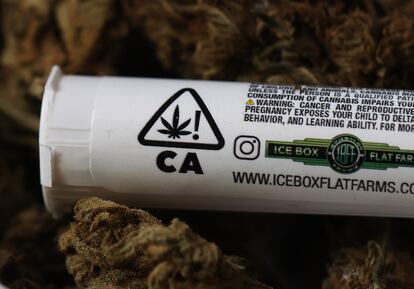Keys to understanding Biden’s proposed marijuana reclassification
Cannabis is currently classified alongside hard drugs such as LSD and ecstasy, which are highly addictive. The new proposal aims to allow experts to investigate its possible medical applications and other benefits

President Joe Biden is seeking a new perspective on cannabis. “No one should be incarcerated for using marijuana,” he said recently. On his recommendation, the U.S. Department of Justice has proposed reclassifying the drug. Currently, the plant is considered just as dangerous as heroin, a highly addictive drug. With reclassification, it would be in the same category as substances such as ketamine or anabolic steroids, with less potential for addiction.
There are several reasons behind this proposal, among them the greater acceptance of cannabis by U.S. citizens, as many support its legalization and regulation. On the other hand, the change in classification would help experts to conduct research and medical studies on the dangers and benefits of the plant without facing legal obstacles.
The proposal was born after Biden asked the Department of Health and Human Services and the attorney general, who oversees the DEA, to review how marijuana was classified and why. Biden has been in favor of legalizing cannabis for medicinal use, and has stressed the importance of consistent evidence of its benefits.
What does the proposal mean?
The Department of Justice is considering moving marijuana from a Schedule I to a Schedule III drug classification, which would represent a major change in federal policies related to cannabis. Being classified as a Schedule I substance, it is considered to have a high potential for abuse, in addition to no medical use, as is the case with heroin, LSD, quaaludes and ecstasy, among others. By entering Schedule III classification, its potential medical uses will be recognized and it will be considered to have a low potential for dependence. However, it will continue to be considered a controlled substance.
Will this make marijuana legal?
No. The proposal to reclassify marijuana does not legalize it in all states. What it would do is relax restrictions on cannabis at the federal level, making it easier for states that wish to regulate it. Each state will continue to have the authority to decide whether to legalize it for medical or recreational purposes. In addition, it will remain legal in territories that already have legislation in its favor.
What is certain is that, with more medical research and greater awareness of its potential benefits, some states may become more open to the possibility of legalizing the plant.
Will it help reduce prison sentences for cannabis-related crimes?
Current anti-cannabis laws have been shown to create injustice and inequity, particularly when it comes to racial disparity in the application of laws and the imposition of prison sentences. However, this reclassification would not change anything for people in prison for cannabis-related crimes. David Culver of the U.S. Cannabis Council made this clear in a statement to the AP: “Put simple, this move from Schedule I to Schedule III is not getting people out of jail.” Nor will it change the way marijuana-related crimes are prosecuted. Recent years have seen a reduction in the number of federal possession cases, so no major changes are expected.
When will the change be made?
The proposal is only the first step. It must be reviewed by the White House Office of Management and Budget, after which it will have a public comment period and review by an administrative judge. The process could take months or even years, plus it could face legal challenges, further delaying implementation.
Sign up for our weekly newsletter to get more English-language news coverage from EL PAÍS USA Edition
Tu suscripción se está usando en otro dispositivo
¿Quieres añadir otro usuario a tu suscripción?
Si continúas leyendo en este dispositivo, no se podrá leer en el otro.
FlechaTu suscripción se está usando en otro dispositivo y solo puedes acceder a EL PAÍS desde un dispositivo a la vez.
Si quieres compartir tu cuenta, cambia tu suscripción a la modalidad Premium, así podrás añadir otro usuario. Cada uno accederá con su propia cuenta de email, lo que os permitirá personalizar vuestra experiencia en EL PAÍS.
¿Tienes una suscripción de empresa? Accede aquí para contratar más cuentas.
En el caso de no saber quién está usando tu cuenta, te recomendamos cambiar tu contraseña aquí.
Si decides continuar compartiendo tu cuenta, este mensaje se mostrará en tu dispositivo y en el de la otra persona que está usando tu cuenta de forma indefinida, afectando a tu experiencia de lectura. Puedes consultar aquí los términos y condiciones de la suscripción digital.









































